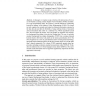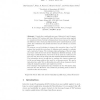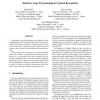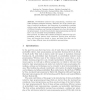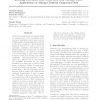123
click to vote
DIS
2005
Springer
15 years 7 months ago
2005
Springer
Abstract. In this paper we explore a topic which is at the intersection of two areas of Machine Learning: namely Support Vector Machines (SVMs) and Inductive Logic Programming (ILP...
127
click to vote
AWIC
2005
Springer
15 years 7 months ago
2005
Springer
This paper presents an approach for applying inductive logic programming to information extraction from HTML documents structured as unranked ordered trees. We consider information...
143
click to vote
AIIA
2005
Springer
15 years 7 months ago
2005
Springer
Machine Learning systems are often distinguished according to the kind of representation they use, which can be either propositional or first-order logic. The framework working wi...
113
click to vote
SAINT
2005
IEEE
15 years 7 months ago
2005
IEEE
Inductive Logic Programming (ILP) is a combination of inductive learning and first-order logic aiming to learn first-order hypotheses from training examples. ILP has a serious b...
118
click to vote
MLG
2007
Springer
15 years 8 months ago
2007
Springer
Abstract. There are many connections between graph mining and inductive logic programming (ILP), or more generally relational learning. Up till now these connections have mostly be...
110
Voted
ILP
2007
Springer
15 years 8 months ago
2007
Springer
Abstract. Despite the considerable success of Inductive Logic Programming, deployed ILP systems still have efficiency problems when applied to complex problems. Several techniques ...
148
click to vote
ILP
2007
Springer
15 years 8 months ago
2007
Springer
We describe an application of inductive logic programming to transfer learning. Transfer learning is the use of knowledge learned in a source task to improve learning in a related ...
101
click to vote
ICDAR
2009
IEEE
15 years 8 months ago
2009
IEEE
In this paper, we make an attempt to use Inductive Logic Programming (ILP) to automatically learn non trivial descriptions of symbols, based on a formal description. This work is ...
130
click to vote
ALT
2004
Springer
15 years 11 months ago
2004
Springer
Probabilistic inductive logic programming, sometimes also called statistical relational learning, addresses one of the central questions of artificial intelligence: the integratio...
101
click to vote
ICML
2004
IEEE
16 years 2 months ago
2004
IEEE
Inductive learning of first-order theory based on examples has serious bottleneck in the enormous hypothesis search space needed, making existing learning approaches perform poorl...
